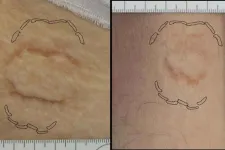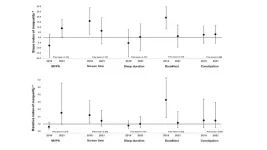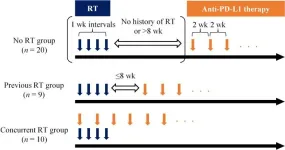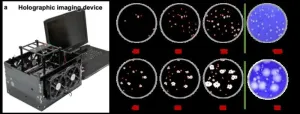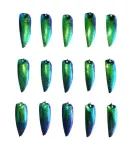(Press-News.org) The commonly-used evidence in trials, bitemark analysis, is not backed up by scientific research – an analysis of current literature, and 12 new studies, shows.
Published in the peer-reviewed Journal of the California Dental Association, the research suggests 26 people have been wrongfully convicted, and some even sentenced to death, from the use of this forensic science.
“The scientific community does not uphold the underlying premises that human teeth are unique and their unique features transfer to human skin,” states lead author Mary Bush, Associate Professor at the State University of New York in Buffalo, NY.
“We find bitemark transfer to skin is not reliable and found that within a population of 1,100 people, with just 25% distortion, a significant number of the population could have created the bite.
“Our findings are a cautionary tale of how dangerous the consequences can be when it is relied on in trials.”
In the team’s dataset, it was noted that there was much more malalignment (and thus fewer matches) in the lower teeth versus the upper teeth. They were also able to examine distortion on actual indentations of the teeth left on skin.
The authors cite the case of Keith Allen Harward who spent 33 years behind bars for a crime he did not commit. The main evidence used to convict Harward was a bitemark on the victim’s skin. A forensic dental expert explained to the jury how Harward's teeth made the bite in such great detail that his own family doubted his innocence.
"Results from DNA testing proved that Harward could not have committed the crime and the real perpetrator was identified. Harward was subsequently released from prison," Professor Bush adds.
Sadly, this is not an isolated case.
The authors note that of the 26 people wrongfully convicted based on bitemark evidence some were sentenced to death. One of those was Eddie Lee Howard, a black man sentenced to death in 1994 for murdering a white woman. He was convicted on bitemark evidence and spent 26 years on death row before being exonerated. According to the Innocence Project, which works to free people wrongly convicted "new forensic opinion regarding bite marks and powerful alibi witnesses and DNA from the murder weapon excluded Mr. Howard, proving his innocence." He was released from Mississippi’s death row in December 2020.
Bush said that the reliance on bitemark evidence was in part due to the conviction of serial killer Ted Bundy who was convicted mainly on bitemark evidence. "In his 1979 trial the distinct imprints of his teeth was key evidence and the national attention given to this trial put bitemark evidence on the map," Bush said.
The authors’ findings that bitemark evidence is unreliable and should not be used in trials are in agreement with prior studies, including one by the National Academy of Sciences (NAS), that there is no scientific data to support the use of bitemark evidence. In 2009, the NAS released a 300-page report on forensic science which found "that the claim that dentists could positively identify a perpetrator by matching their dental patterns to marks on victims’ bodies had never been supported by any scientific study." Yet belief in bitemark analysis persists today.
Their findings are also in agreement with a just-published review by the U.S. National Institute of Standards and Technology (NIST) which found a lack of support for three key premises of the field: "the human dentition is unique at the individual level; that the uniqueness can be accurately transferred to human skin, and identifying characteristics can be accurately captured and interpreted by analysis techniques." Their review also found a lack of consensus among practitioners on the interpretation of bitemark data as well as thoughts on how to move the field forward.
The authors hope that by presenting their findings at national meetings and publishing in peer-reviewed journals, they can raise awareness of the unreliability of bitemark evidence and the potential issues with the evidence, and the possible liabilities of testifying at trials.
END
Forensic bitemark analysis for court trials is not supported by sufficient data and “is leading to wrongful convictions”
2023-06-23
ELSE PRESS RELEASES FROM THIS DATE:
COVID-19's impact on socioeconomic inequality in health behaviors among Japanese adolescents
2023-06-23
Key Findings
This study is the first worldwide to investigate time trend in socioeconomic inequality in various health behaviors among adolescents before and during the COVID-19 pandemic.
The study found widening socioeconomic inequality among Japanese adolescents in achieving recommended physical activity levels before and during the pandemic, alongside narrowing inequality in breakfast intake. Specifically, despite no observed differences in physical activity by income in 2019, by 2021, adolescents from families with lower equivalent household incomes were less likely to engage in physical activity.
Research is needed to continue monitoring the impact these phenomena will have ...
More exposure needed for cosmetic breast enhancement risks
2023-06-23
Complications after cosmetic breast augmentation are more common than other cosmetic plastic surgery yet many women who undergo such procedures are often in the dark about the associated risks say QUT researchers.
The authors of a new paper argue the need for more disclosure early (and in much simpler terms) of those risks and the high likelihood of revision surgery being required so when women give their consent, they have a greater understanding of what may happen.
“The Australian cosmetic surgery industry is worth billions but there are concerns inside the industry on potential issues surrounding whether patients ...
Combination therapy effective against canine melanoma
2023-06-23
A combination of radiotherapy followed by immunotherapy is a promising strategy for the treatment of oral malignant melanomas in dogs.
Melanomas are the most common oral cancers in dogs. It is highly metastatic and conventional chemotherapy does not increase survival time. Canine oral melanomas are similar to human melanomas; thus, research is being conducted into adapting treatments developed for human melanomas for dogs.
A particularly effective therapy for treating human melanomas is a combination of immune checkpoint inhibitors and radiotherapy. A team of researchers led by Professor Satoru Konnai at Hokkaido University has investigated ...
Building the semiconductor workforce of the future
2023-06-23
The University of Utah is one of thirteen founding partner members of the Northwest University Semiconductor Network, a partnership with and created by Micron Technology, Inc. whose goal is to help develop the next generation of the United States’ semiconductor industry’s workforce.
Micron, one of the world’s largest semiconductor companies, made the announcement on Monday. In a press release the company stated the Northwest University Semiconductor Network will “drive foundational and emerging research to increase students’ ...
New rapid viral plaque detection system, aided by deep learning and holographic imaging, can help accelerate vaccine and drug development
2023-06-23
Findings
In a new paper published in Nature Biomedical Engineering, a team of scientists led by Professor Aydogan Ozcan from the Electrical and Computer Engineering Department at UCLA and an associate director of the California NanoSystems Institute, developed a rapid, stain-free, and automated viral plaque detection system enabled by holography and deep learning. This system incorporates a cost-effective and high-throughput holographic imaging device that continuously monitors the unstained virus-infected cells during their incubation process. At each imaging cycle, these ...
New ruling on care of dying will force some to live life “of machine-related suffering”
2023-06-23
The newly revised ruling on advance medical directives and withholding/withdrawing medical support for the dying in India will inevitably force some terminally ill patients to “live a life of machine-related suffering” and deprive them of their autonomy and dignity in death, suggest specialist doctors in a letter published online in the journal BMJ Supportive & Palliative Care.
While a progressive step, the 2023 ruling still has important shortcomings, they add.
In the absence of any specific legislation ...
Global diabetes cases to soar from 529 million to 1.3 billion by 2050
2023-06-23
***Embargo: 23.30 UK time / 18:30 ET / 15:30 PT Thursday, 22 June 2023***
SEATTLE, Wash. June 22, 2023 – More than half a billion people are living with diabetes worldwide, affecting men, women, and children of all ages in every country, and that number is projected to more than double to 1.3 billion people in the next 30 years, with every country seeing an increase, as published today in The Lancet.
The latest and most comprehensive calculations show the current global prevalence rate is 6.1%, making diabetes one of the top 10 leading causes of death and disability. At the super-region level, the ...
Surrey expert recognized on International Women in Engineering Day
2023-06-23
The Women’s Engineering Society has named the University of Surrey’s Dr Kelly Kousi as one of the finalists in its Top 50 Women in Engineering Awards (WE50) 2023: Safety and Security. The announcement coincides with International Women in Engineering Day 2023, a celebration of women in engineering.
Dr Kousi, a lecturer in the School of Chemistry and Chemical Engineering, leads a research group of scientists and engineers who work on emission control, synthetic fuel production ...
Gloss is less effective camouflage in beetles compared to matte, according to latest study
2023-06-23
When combined with iridescent colouration, a matt target surface appearance confers greater survival benefits in beetles than a glossy surface, scientists at the University of Bristol have found.
The findings, published in Behavioural Ecology, suggest that iridescence provides camouflage independent of glossiness, which means that it is the colour of iridescent surfaces and its changeability, that is the most important aspect of iridescence in enabling camouflage.
Iridescence is a type of structural colouration that produces bright, vibrant hues. These are often angle-dependent, meaning the observed colour appears to ...
UW–Madison researchers reveal how key protein might help influenza A infect its hosts
2023-06-23
Influenza A is one of two influenza viruses that fuel costly annual flu seasons and is a near constant threat to humans and many other animals. It's also responsible for occasional pandemics that, like the one in 1918, leave millions dead and wreak havoc on health systems and wider society.
Influenza A was first identified as a health threat nearly a century ago, but only in the last decade have scientists identified one of the virus’s key proteins for infiltrating host cells and short-circuiting their defenses. Now, a team of researchers at the University of Wisconsin–Madison have taken a major step toward ...
